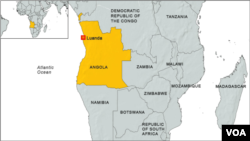Angola's main opposition parties say authorities have killed hundreds of people in attacks on a religious sect. The alleged attacks followed the death of nine police officers as police tried to seize the leader of the sect.
Two weeks ago, nine police officers were killed during a raid in Huambo province aimed at capturing Jose Kalupeteka, leader of an outlawed sect called "The Light of the World."
The country’s main opposition party, the National Union for the Total Independence of Angola, UNITA, contends that authorities killed hundreds of people in retaliatory attacks.
Angolan officials deny the accusation. They say the popular firebrand preacher Kalupeteka was captured and just 13 sect members were killed.
Numbers have been difficult to verify as access to the affected area has been sealed off. But several locals have described what happened as “an environment of war."
Justino Tchipango, the sect’s second-in-command, told VOA’s Portuguese-to-Africa Service that the police came to where they were worshiping and “all hell broke loose.” He says the authorities killed many people, including women and children.
Paula Roque, senior analyst from International Crisis Group in South Africa, says that pressure is mounting for a formal inquiry.
“Internationally, this is the last thing Angola wants. Angola is sitting on the U.N. Security Council; it does not want any scrutiny in human rights violations, issues that could trigger any investigation looking into how Angola has transitioned post-conflict after Africa’s most brutal war,” said Roque. “But the reality is that the discrepancies of numbers that the authorities are claiming and the opposition and other sources are claiming - you cannot reconcile those two numbers,” she added.
‘Propensity to intolerance’
Kalupeteka, who formed “The Light of the World” church 14 years ago after he was expelled from the Seventh Day Adventist Church, has thousands of followers across Angola. He preaches that the world will end in 2015, encouraging followers to abandon their belongings and live in seclusion.
During a state address on April 20, President José Eduardo dos Santos said that he considered the sect a threat to peace declaring that every effort had to be taken to dismantle it.
Speaking to VOA from Huambo province, human rights activist Angelo Kapuatcha said the president’s directive was “equivalent to genocide against a religious group."
Roque says Angola is generally not tolerant of what it considers extremist groups.
“Angola is a conservative country when it comes to religious groupings; there is a propensity to intolerance when it comes to other religious organizations, other sects that don’t fall in line with its own national identity. It doesn’t react well and it has clamped down a lot on sects of this nature,” said Roque.
Some Christian groups operating in Huambo province were declared illegal by the government, according to the newspaper Jornal de Angola. New guidelines require such groups to have 100,000 registered members spread across at least a third of Angola's 18 provinces, the newspaper reported.
Christian Vision is among the groups that have been shut down. Oliver Raper, director of Christian Vision, says that two of its churches in Huambo and Nambe provinces have been suspended but otherwise activities are continuing as normal.
Correction: An earlier version of this story stated World Vision has been banned in Angola, citing a report from Jornal de Angola. That report was incorrect. World Vision has not been banned in Angola and their operations are running as normal.




